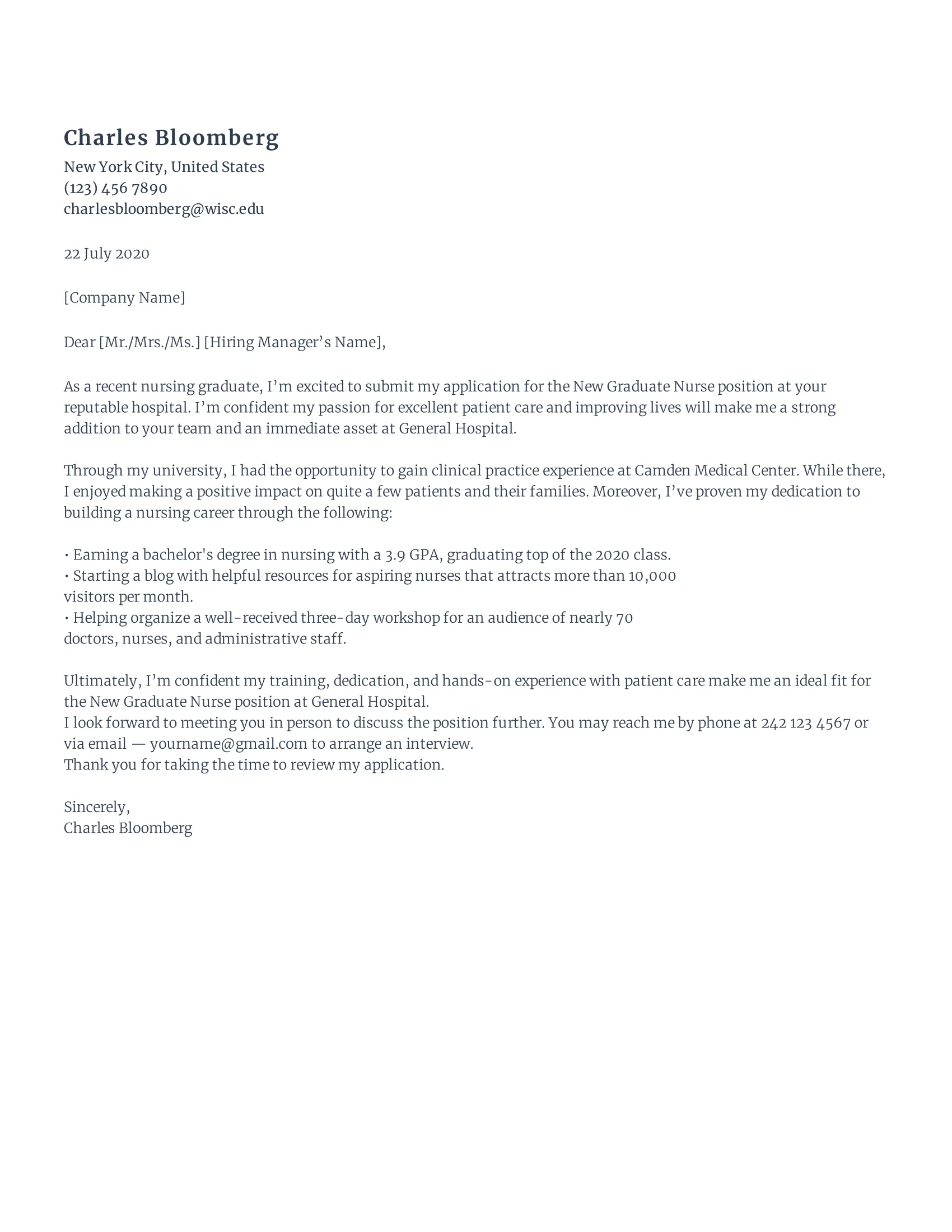Crafting Your New Grad Nursing Cover Letter
As a new graduate nurse, your cover letter is your first introduction to potential employers. It is a crucial document that can significantly impact your chances of landing an interview and ultimately, your dream nursing job. A well-crafted cover letter showcases your skills, highlights your qualifications, and demonstrates your enthusiasm for the nursing profession. This guide will provide you with the essential steps to create a compelling cover letter that grabs the attention of hiring managers and sets you apart from other candidates.
Understanding the Importance of a Cover Letter
While your resume provides a concise overview of your education, experience, and skills, your cover letter allows you to elaborate on these points and express your personality. It is an opportunity to tell your story, explain why you are passionate about nursing, and connect your qualifications to the specific requirements of the job. A strong cover letter goes beyond simply restating the information in your resume; it provides context and demonstrates your genuine interest in the position and the organization.
Highlighting Your Skills and Qualifications
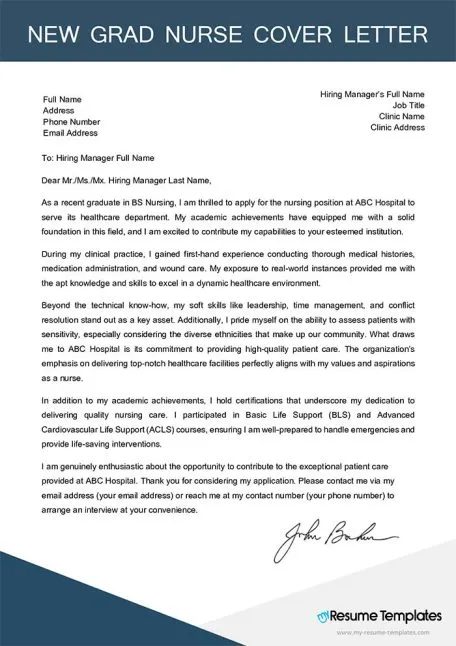
Your cover letter should clearly articulate your nursing skills and qualifications. Even as a new graduate, you possess valuable skills gained through your nursing education, clinical rotations, and any volunteer or extracurricular activities. Identify the skills that are most relevant to the job description, such as patient assessment, medication administration, critical thinking, communication, and teamwork. Provide specific examples of how you have demonstrated these skills in your past experiences, even if they are limited.
Reviewing Your Nursing Education
Briefly summarize your nursing education, including the name of your nursing school, your degree, and your graduation date. Mention any honors or awards you received. Highlight any specialized training or coursework you completed, such as certifications in advanced cardiac life support (ACLS) or pediatric advanced life support (PALS). This section helps the hiring manager understand the foundation of your nursing knowledge and skills.
Showcasing Relevant Clinical Experience
Detail your clinical experiences, including the settings where you completed your rotations, the patient populations you worked with, and the types of procedures you performed. Focus on the experiences that are most relevant to the job you are applying for. Use action verbs to describe your responsibilities and accomplishments. For example, instead of writing ‘assisted with patient care’, write ‘provided comprehensive patient care, including medication administration, wound care, and patient education, resulting in improved patient outcomes’.
Formatting Your Cover Letter for Success
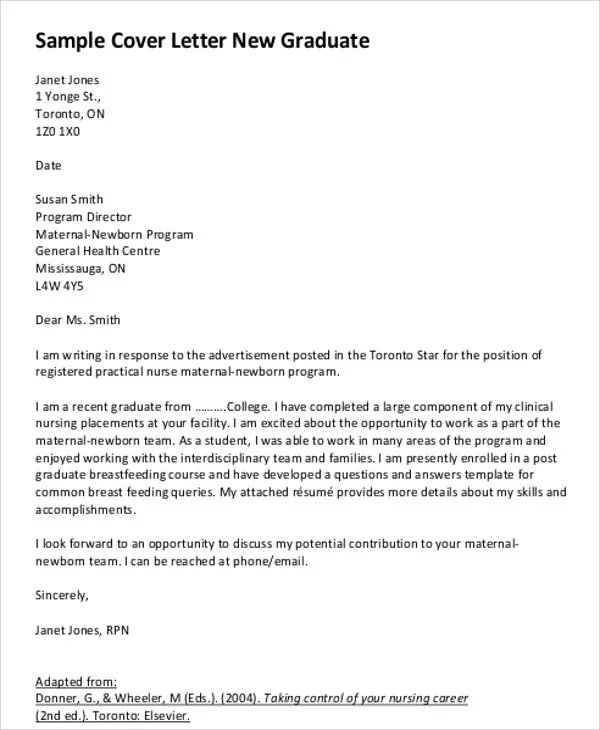
The format of your cover letter is essential for making a positive first impression. It should be easy to read, well-organized, and professional in appearance. A poorly formatted letter can detract from the content and make it difficult for the hiring manager to quickly grasp your qualifications.
Using a Professional and Clean Layout
Use a standard business letter format with a professional font such as Times New Roman or Arial, and a font size between 10 and 12 points. Leave ample margins on all sides of the page. Use single spacing within paragraphs and double spacing between paragraphs. Avoid using excessive bolding, underlining, or italics.
Structuring Your Cover Letter Effectively
A well-structured cover letter typically includes the following sections contact information, a greeting, an opening paragraph, a body paragraph (or paragraphs), and a closing paragraph. Ensure that each section serves a clear purpose and flows logically into the next. The overall structure should be easy for the reader to follow and should highlight the most important information in a concise and impactful manner.
Writing a Compelling Opening Statement
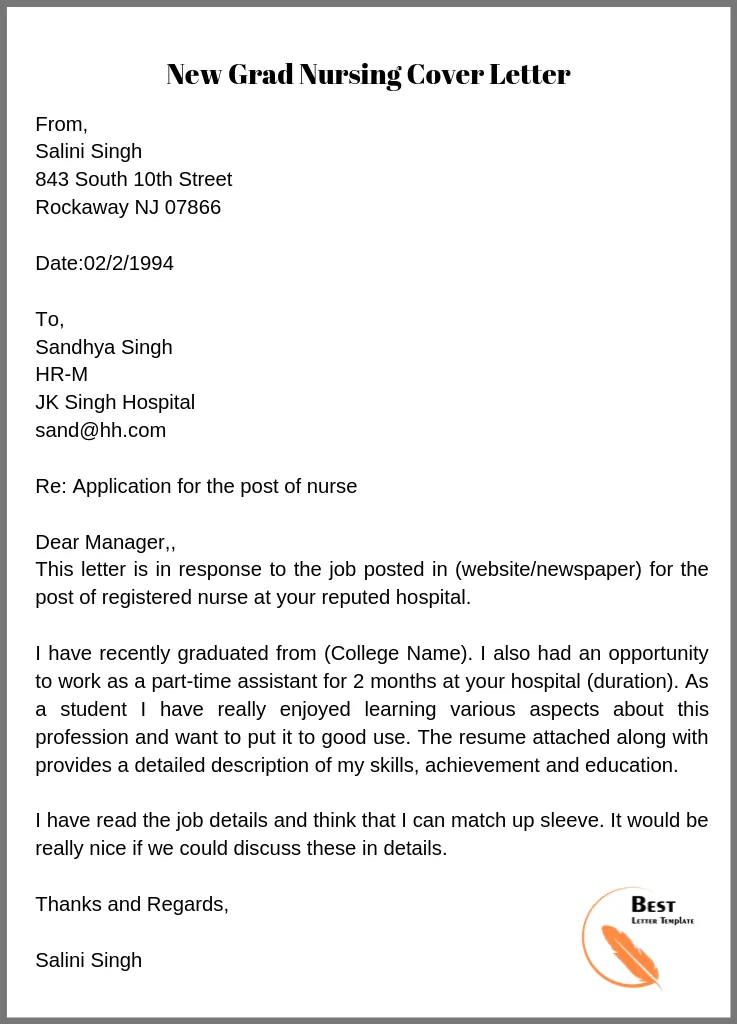
The opening paragraph is your chance to grab the hiring manager’s attention and make a strong first impression. It should clearly state the position you are applying for and how you learned about the opportunity. Express your enthusiasm for the role and the organization. Briefly mention your key qualifications or a compelling accomplishment that makes you stand out. Avoid generic openings and aim for a personalized and engaging introduction.
Grabbing the Hiring Manager’s Attention
Instead of starting with a generic sentence like ‘I am writing to apply for the position of…’, try something more engaging. You might mention a specific aspect of the job that excites you, or reference a conversation you had with someone at the organization. If the job posting mentioned a particular challenge the hospital is facing, you could briefly state how your skills align to addressing that need.
Detailing Your Nursing Skills and Achievements
The body of your cover letter should provide more detail about your skills, qualifications, and experiences. Use this section to showcase your abilities and demonstrate why you are a good fit for the position. Support your claims with specific examples from your clinical rotations, volunteer work, or other relevant experiences.
Quantifying Your Accomplishments
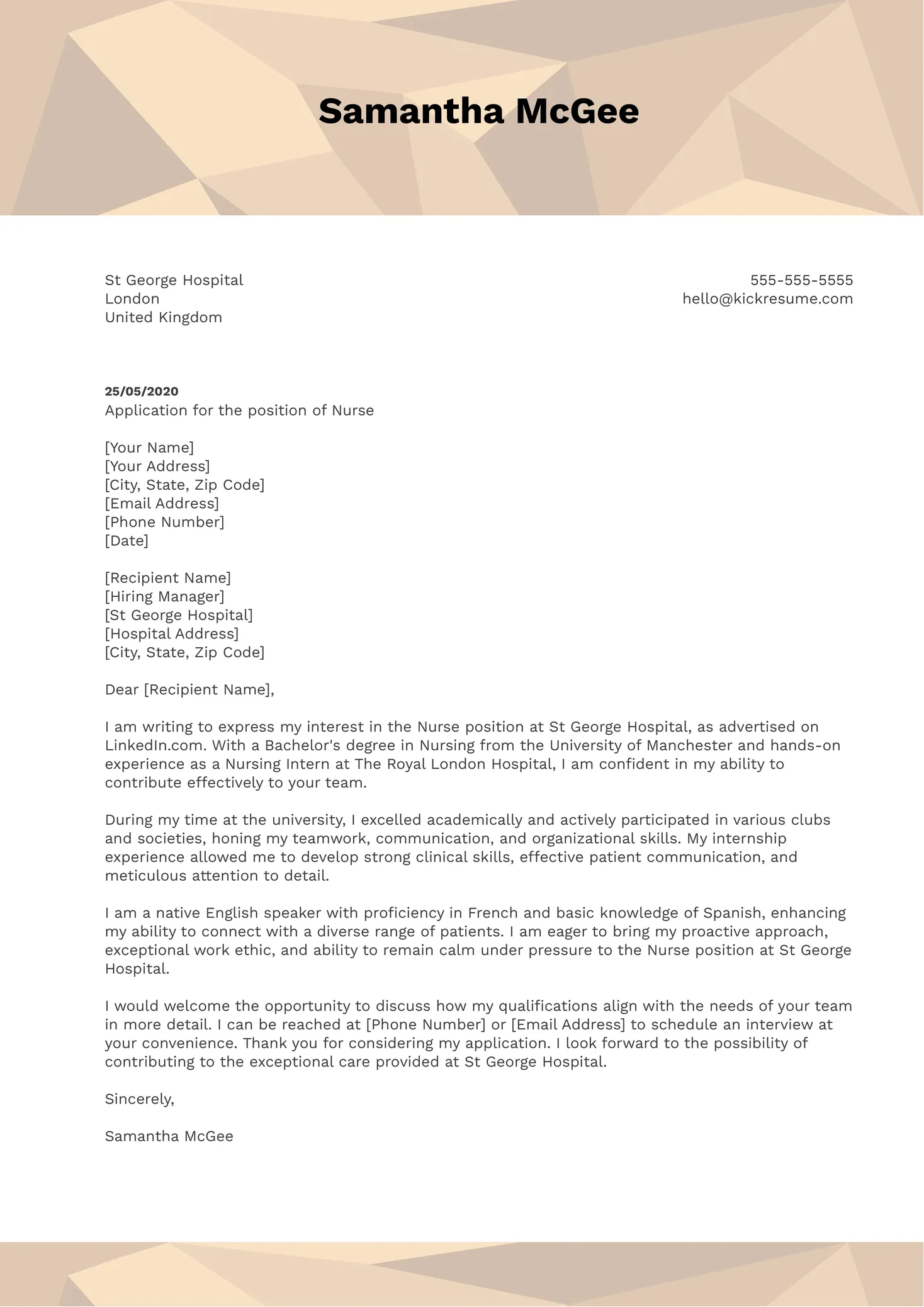
Whenever possible, quantify your accomplishments to demonstrate your impact. For example, instead of saying ‘Improved patient satisfaction’, say ‘Improved patient satisfaction scores by 15% through implementation of a new communication strategy’. Quantifiable achievements provide concrete evidence of your capabilities and make a more compelling case for your candidacy.
Highlighting Your Clinical Expertise
Focus on the clinical skills and experiences that align with the job description. For instance, if the job requires experience in critical care, highlight your rotations in the ICU or your skills in managing critically ill patients. If you have any certifications or specialized training, be sure to mention them. This section should demonstrate to the hiring manager that you possess the necessary skills and knowledge to excel in the role.
Demonstrating Your Passion for Nursing
Expressing your passion for nursing is crucial for making a lasting impression. Hiring managers want to see that you are genuinely interested in the profession and are committed to providing excellent patient care. This is also a good opportunity to highlight your unique experiences and why they have shaped your approach to patient care.
Expressing Your Enthusiasm and Dedication
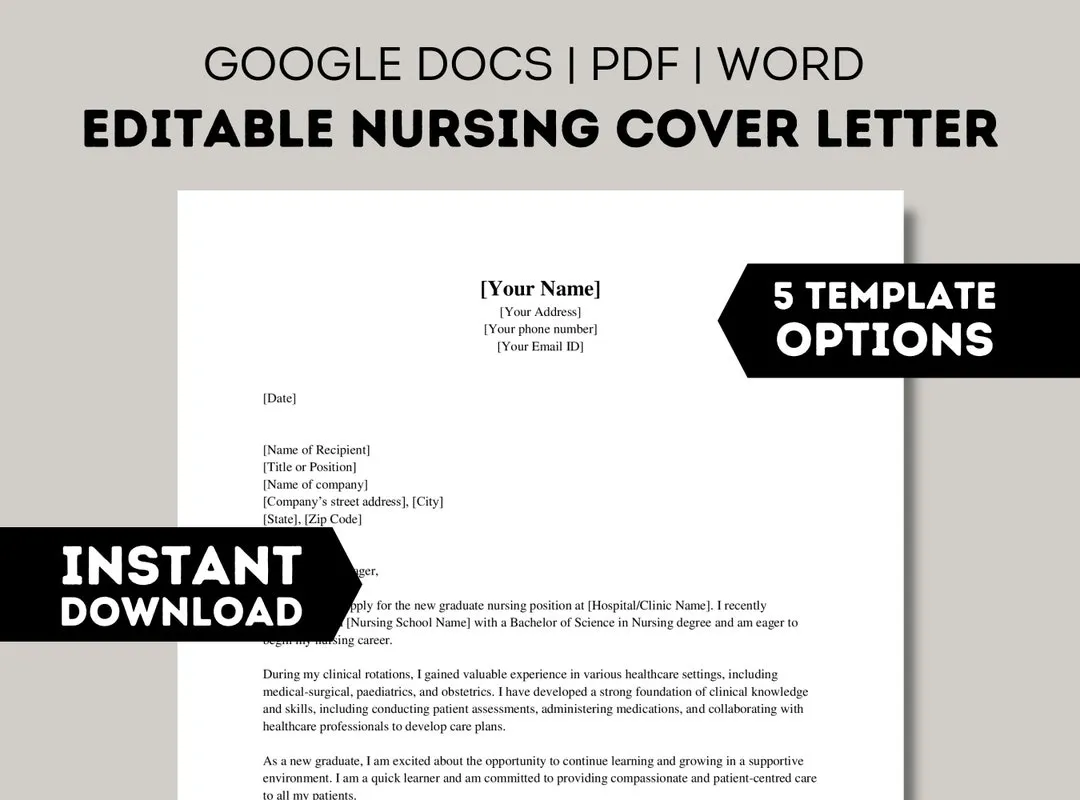
Showcase your enthusiasm for the nursing profession and your commitment to patient care. Discuss what aspects of nursing you find most rewarding and what motivates you to excel in your work. Emphasize your willingness to learn and grow, and your dedication to providing compassionate and high-quality care.
Emphasizing Your Fit for the Role
Clearly articulate why you are a good fit for the specific role and the organization. Explain how your skills, experiences, and personality align with the requirements of the job and the values of the employer. Demonstrate that you have researched the organization and understand its mission, values, and culture.
Tailoring Your Cover Letter to Each Job
Avoid sending out a generic cover letter to every job you apply for. Take the time to tailor your letter to each specific position and organization. This demonstrates that you are genuinely interested in the opportunity and have taken the time to understand the requirements of the role.
Researching the Employer and the Role
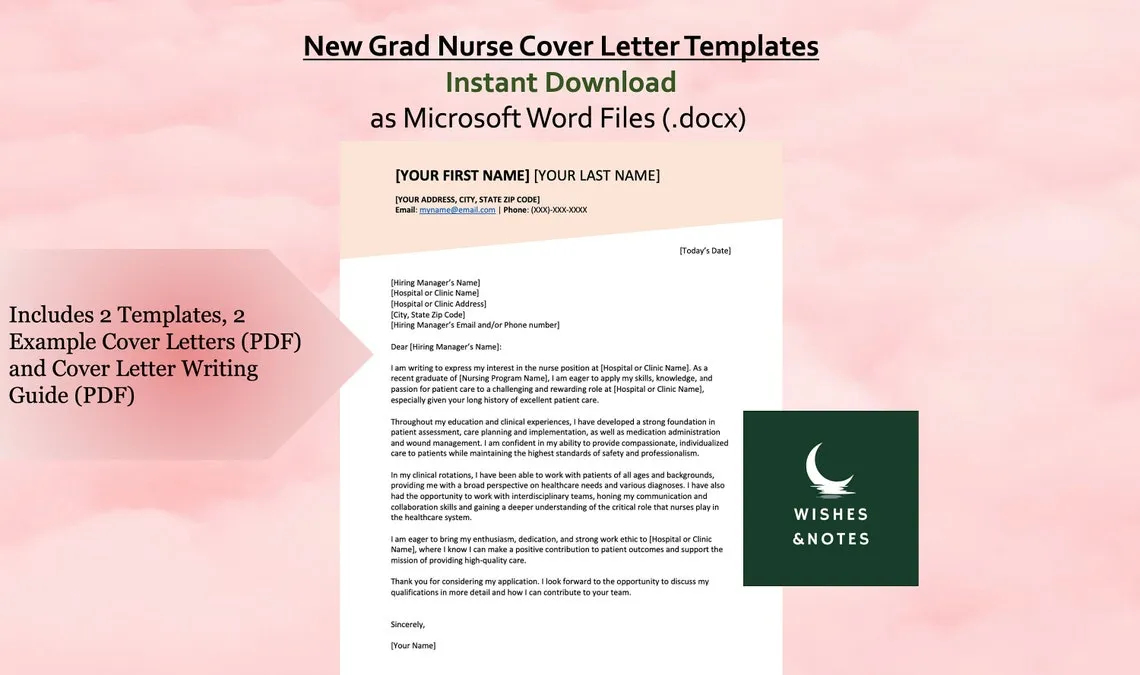
Before writing your cover letter, research the employer and the specific job you are applying for. Visit the organization’s website, read the job description carefully, and learn about their mission, values, and culture. Understanding the employer’s needs and expectations will help you tailor your letter to showcase your relevant skills and experience.
Customizing Your Cover Letter Content
Customize your cover letter content to match the specific requirements of the job description. Highlight the skills, experiences, and qualifications that are most relevant to the position. Use the keywords from the job description throughout your letter to demonstrate that you meet the employer’s needs. Show how your unique experiences and perspectives make you the ideal candidate.
Including Keywords from the Job Description
Carefully review the job description and identify the key skills and qualifications the employer is seeking. Incorporate relevant keywords and phrases throughout your cover letter to demonstrate that you possess the necessary skills and experience. This will also help your cover letter get past applicant tracking systems (ATS), which often scan for specific keywords.
Writing a Strong Closing Statement
The closing paragraph of your cover letter is your final opportunity to make a positive impression. It should reiterate your interest in the position, express your availability for an interview, and thank the hiring manager for their time and consideration.
Reiterating Your Interest and Availability
Reiterate your strong interest in the position and the organization. Clearly state your availability for an interview and provide your contact information. You can also mention your eagerness to discuss your qualifications further and learn more about the opportunity. This final message should leave a lasting impression of your enthusiasm and dedication.
Thanking the Hiring Manager for Their Time
Express your gratitude to the hiring manager for their time and consideration. This shows respect and professionalism, and it leaves a positive impression. A simple closing such as ‘Thank you for your time and consideration. I look forward to hearing from you soon’ is appropriate.
Proofreading and Editing Your Cover Letter
Proofreading and editing your cover letter is essential for ensuring accuracy and professionalism. Errors in grammar, spelling, or punctuation can detract from your message and make you appear careless. Take the time to carefully review your letter for any mistakes.
Ensuring Accuracy and Professionalism
Carefully check for any spelling or grammatical errors. Ensure that your contact information is accurate and up-to-date. Use proper punctuation and capitalization. Proofread your letter multiple times, and consider using a grammar checker to catch any errors you may have missed. A polished cover letter will demonstrate your attention to detail and professionalism.
Seeking Feedback from Others
Ask a trusted friend, family member, or career advisor to review your cover letter. They can provide valuable feedback on your writing style, clarity, and overall effectiveness. A fresh pair of eyes can often catch errors that you may have missed. Be open to their suggestions and make revisions as needed.
Common Mistakes to Avoid
Certain mistakes can significantly decrease your chances of getting hired. Being aware of these common pitfalls will help you avoid them and increase your chances of success.
Generic Cover Letters
Avoid using generic cover letters that are not tailored to the specific job or organization. These letters often lack impact and do not demonstrate your genuine interest in the opportunity. Always customize your cover letter to show that you understand the job requirements and are a good fit for the organization. Remember, a personalized letter shows the employer that you are truly interested in the role.
Typos and Grammatical Errors
Typos and grammatical errors can create a negative impression and make you appear careless. Always proofread your cover letter carefully before submitting it. Use a grammar checker and ask someone else to review it for any mistakes.
Lying or Exaggerating Your Experience
Never lie or exaggerate your experience or qualifications. Doing so can lead to serious consequences, including job termination. Be honest and truthful in your cover letter and resume. Focus on highlighting your strengths and experiences in a way that is accurate and compelling.
Resources for New Grad Nurses
There are several resources available to help new graduate nurses create effective cover letters, find job opportunities, and advance their careers.
Nursing Organizations and Associations
Join nursing organizations and associations such as the American Nurses Association (ANA) or the National Student Nurses’ Association (NSNA). These organizations offer valuable resources, career advice, and networking opportunities. Many offer resume and cover letter review services.
Online Resume and Cover Letter Builders
Utilize online resume and cover letter builders to help you create professional-looking documents. These tools provide templates, formatting options, and writing tips to help you create a compelling cover letter. Several are free and easy to use. They also provide examples and best practices.
Networking Opportunities for New Grads
Attend nursing career fairs, workshops, and seminars to connect with potential employers and learn about job opportunities. Network with other nurses and professionals in the healthcare industry. Building relationships can provide valuable insights into the job market and help you land your dream nursing job. Utilize LinkedIn to connect with nurses and recruiters.
